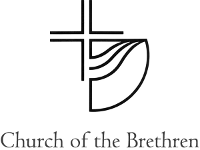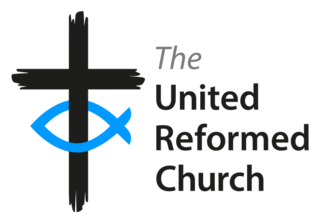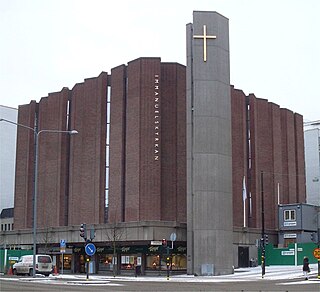Related Research Articles

The Presbyterian Church (USA), abbreviated PCUSA, is a mainline Protestant denomination in the United States. It is the largest Presbyterian denomination in the country, known for its liberal stance on doctrine and its ordaining of women and members of the LGBT community as elders and ministers. The Presbyterian Church (USA) was established with the 1983 merger of the Presbyterian Church in the United States, whose churches were located in the Southern and border states, with the United Presbyterian Church in the United States of America, whose congregations could be found in every state.

The Church of the Brethren is an Anabaptist Christian denomination in the Schwarzenau Brethren tradition that was organized in 1708 by Alexander Mack in Schwarzenau, Germany during the Radical Pietist revival. The denomination holds the New Testament as its only creed. Historically, the church has taken a strong stance for nonresistance or Christian pacifism—it is one of the three historic peace churches, alongside the Mennonites and Quakers. Distinctive practices include believer's baptism by forward trine immersion; a threefold love feast consisting of feet washing, a fellowship meal, and communion; anointing for healing; and the holy kiss. Its headquarters are in Elgin, Illinois, United States.

The United Reformed Church (URC) is a Protestant Christian church in the United Kingdom. As of 2024 it had approximately 44,000 members in around 1,250 congregations with 334 stipendiary ministers.

The Presbyterian Church in America (PCA) is the second-largest Presbyterian church body, behind the Presbyterian Church (USA), and the largest conservative Calvinist denomination in the United States. The PCA is Reformed in theology and presbyterian in government.

The Evangelical Covenant Church (ECC) is a Radical Pietistic denomination of evangelical Christianity. The denomination has 129,015 members in 878 congregations and an average worship attendance of 219,000 people in the United States and Canada with ministries on five continents.

The Church of South India (CSI) is a united Protestant Church in India. It is the result of union of a number of Protestant denominations in South India that occurred after the independence of India.

The United Presbyterian Church of North America (UPCNA) was an American Presbyterian denomination that existed for one hundred years. It was formed on May 26, 1858, by the union of the Northern branch of the Associate Reformed Presbyterian Church with the Associate Presbyterian Church (Seceders) at a convention at the Old City Hall in Pittsburgh. On May 28, 1958, it merged with the Presbyterian Church in the United States of America (PCUSA) at a conference in Pittsburgh to form the United Presbyterian Church in the United States of America (UPCUSA).

The Free Presbyterian Church of Ulster is a Calvinist denomination founded by Ian Paisley in 1951. Doctrinally, the church describes itself as fundamentalist, evangelical, and separatist, and is part of the reformed fundamentalist movement. Most of its members live in Northern Ireland, where the church is headquartered, and in County Donegal. The church has additional congregations in the Republic of Ireland, Great Britain and Australia, and a sister denomination in North America, the Free Presbyterian Church of North America, which has congregations in Canada and the United States. It also has a sister denomination in Nepal which was formed from the Nepal mission to the Unreached in November 2013.

The Protestant Reformed Churches in America is a Protestant denomination of 33 churches and over 8,000 members.

The Mission Covenant Church of Sweden, founded in 1878, was a Swedish evangelical free church in the Radical Pietist tradition. It was the second-largest Protestant denomination in Sweden, after the national church, the Church of Sweden. In 2011, the Mission Covenant Church of Sweden completed a merger with two other denominations, resulting in the new denomination Uniting Church in Sweden. The denomination was a member of the Swedish Free Church Council, the International Federation of Free Evangelical Churches, and the World Communion of Reformed Churches.
Biblical Witness Fellowship is an evangelical renewal movement composed of members of the United Church of Christ. Founded in 1978 as the United Church People for Biblical Witness, the movement reorganized as the Biblical Witness Fellowship at a national convocation in Byfield, Massachusetts in 1984, hosted by the current president of BWF, the Rev. Dr. William Boylan.
The Japan Evangelical Lutheran Church or JELC is a Lutheran church in Japan. It currently has approximately 21,990 baptized members in 122 congregations nationwide.

Christianity is a minority religion in Maharashtra, a state of India. Approximately 79.8% of the population of Maharashtra are Hindus, with Christian adherents being 1.0% of the population. The Roman Catholic archdiocese whose seat is in Maharashtra is the Roman Catholic Archdiocese of Bombay. There are two different Christian ethnic communities in Maharashtra: the Bombay East Indians, who are predominantly Roman Catholic, and the Marathi Christians, who are predominantly Protestant with a small Roman Catholic population.

The Presbyterian Church of Brazil is an Evangelical Protestant Christian denomination in Brazil. It is the largest Presbyterian denomination in the country, having an estimate 702,949 members, 4,915 ordained ministers and 5,420 churches and parishes. It is also the only Presbyterian denomination in Brazil present in all 26 States and the Federal District.
Telugu Christians or Telugu Kraistava are a religious community who form the third-largest religious minority in the Indian states of Andhra Pradesh and Telangana. According to the 2001 Census of India, there are over a million Christians in Andhra Pradesh, constituting around 1.51% of the state's population. This is a decrease from the 1971 census figure which put the percentage of Christians in state as 2%, and this decrease is mainly a result of low birth rates and emigration.
The Presbyterian Church of the Philippines (PCP), officially The General Assembly of the Presbyterian Church of the Philippines, is a growing evangelical, Bible-based Reformed church in the Philippines. It was officially founded by in 1986 and the General Assembly was organized in September 1996.
The Africa Evangelical Presbyterian Church (AEPC) is a growing conservative Presbyterian and Reformed Church which adheres to the Westminster Confession of Faith started in Kenya, later spread to the surrounding countries like Burundi, Tanzania, Congo and as far as Zimbabwe. The headquarters of the church is located in Nairobi, Kenya. The current Moderator is Rev. Dr Joseph Mutei installed on Sunday 26th June 2022.
The Reformed Presbyterian Church in Taiwan was officially established in 1971 when the First Presbytery was formed as a result of the union of various conservative Presbyterian and Continental Reformed congregations planted by various missionary groups. Its origin could be traced back to the 1950s when the very first missionaries of those Presbyterian and Continental Reformed missionaries arrived in Taiwan.
The Evangelical Church of Congo, member of the World Communion of Reformed Churches, is the second largest Christian denomination in the Republic of Congo after the Catholic Church. It has approximately 150,000 members, and is present throughout the country.
Lutheranism was first introduced to Mexico in the 1850s, when German-American Lutherans began serving German immigrants in Mexico, though mission work among the non-German population in Mexico did not begin until the 1940s. Today there are five Lutheran church bodies in Mexico—the Mexican Lutheran Church, the Lutheran Synod of Mexico, the Confessional Evangelical Lutheran Church—Mexico, the Evangelical Lutheran Church of Mexico (unaffiliated), and the Lutheran Apostolic Alliance of Mexico (unaffiliated)—and several independent congregations.
References
- Fält, H. (2004).Mission i religionernas land, Svenska Missionskyrkan, Stockholm.
- Svärd, Lydia (1979).Förbundskyrkan i Indien, Gummessons, Stockholm.